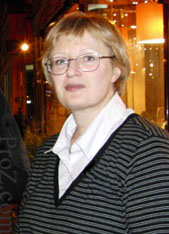| Pages in topic: [1 2 3 4 5 6 7] > | '[MT] is most often used alongside [TM] as an adjunct to human translation'. Are you using it? Thread poster: Henry Dotterer
|
|---|
A recent edition of the Translorial (NCTA's newsletter) says:
This seems to reflect today’s reality: machine translation is most often used alongside translation memory as an adjunct to human translation.
I wonder: how many of you are using MT now, alongside TM, in your work? For what type of work is it most effective, or least effective? Technically speaking, how are you accessing the MT functionality - through a CAT tool, cut and paste, or other means?
This is something I have touched on in my conference presentations on the future of the industry. I would like updated information on the topic.
I hope to get feedback from a variety of people. Just in case this thread might be contentious, I would ask in advance that you limit yourself to one or two posts.
| | | |
I keep an eye on MT options out there and still haven't found anything that can understand my regular work, so I don't use it.
| | | | Ralf Lemster 
Germany
Local time: 12:41
English to German
+ ...
| Not using MT | Mar 16, 2009 |
Henry,
Admittedly, I haven't had a look at MT for a long time, but given the complexity of most of the projects we're working on, I'm not keen on trying.
Best regards,
Ralf
| | | | | Not good enough yet | Mar 16, 2009 |
Tomás Cano Binder, CT wrote:
I keep an eye on MT options out there and still haven't found anything that can understand my regular work, so I don't use it.
Same here, I do check various MT options regularly, but:
a) they do not provide the quality I require
b) they are more or less incompatible with my work process
| | |
|
|
|
Niraja Nanjundan (X) 
Local time: 16:11
German to English
| Recent article on quality and machine translation | Mar 16, 2009 |
I don't use machine translation (not yet anyway), but recently read an article in the Journal of Specialised Translation that argues quite convincingly in its favour.
Here's the link:
http://www.jostrans.org/issue11/art_fiederer_obrien.pdf
| | | | | Yes, they claim that it is good, but... with a trick | Mar 16, 2009 |
I haven't read the article in full, but from page 1 they already say that MT could be good for situations in which controlled language is possible...
| | | | Elías Sauza 
Mexico
Local time: 04:41
Member (2002)
English to Spanish
+ ...
| Not using it | Mar 16, 2009 |
Recently, a leader in translation technology offered me editing work of texts which would be translated using their Knowledge-based translation system. Allegedly, this high-quality translation system combined translation memory and automated translation of high performance. They sent me a short editing test in which even most of the 100% matches needed editing work.
MT is far from being what some claim it is. I'd rather not use nor accept work that involves MT.
Regards... See more Recently, a leader in translation technology offered me editing work of texts which would be translated using their Knowledge-based translation system. Allegedly, this high-quality translation system combined translation memory and automated translation of high performance. They sent me a short editing test in which even most of the 100% matches needed editing work.
MT is far from being what some claim it is. I'd rather not use nor accept work that involves MT.
Regards,
Elías ▲ Collapse
| | | | Natalie 
Poland
Local time: 12:41
Member (2002)
English to Russian
+ ...
MODERATOR SITE LOCALIZER | Absolutely not | Mar 16, 2009 |
I specialise in pharmaceutical, medical, biochemical translations. I don't believe that any MT system will be able to perform at least acceptable draft translations in the nearest future. Such texts are way too complicated for any MT system.
| | |
|
|
|
Jan Willem van Dormolen (X) 
Netherlands
Local time: 12:41
English to Dutch
+ ...
| Tried it once in a while | Mar 16, 2009 |
I've tried several MT's once in a while, but I'm not enthusiastic. The results fall into three groups:
1) sentences that are translated (almost) correctly - about 15%
2) sentences that contain errors, but are useable somehow - about 50%
3) sentences that are completely unuseable or even gibberish and that I have to delete completely and start from scratch myself - about 35%
All in all, there's so much junk among the useful, that it does not speed up my working temp... See more I've tried several MT's once in a while, but I'm not enthusiastic. The results fall into three groups:
1) sentences that are translated (almost) correctly - about 15%
2) sentences that contain errors, but are useable somehow - about 50%
3) sentences that are completely unuseable or even gibberish and that I have to delete completely and start from scratch myself - about 35%
All in all, there's so much junk among the useful, that it does not speed up my working tempo. The days are over that it actually slowed me down, but the bottom line is still that it doesn't help. ▲ Collapse
| | | | Margreet Logmans (X) 
Netherlands
Local time: 12:41
English to Dutch
+ ...
| Tried and failed | Mar 16, 2009 |
Hi Henry,
interesting topic!
I have used MT a couple of times as a form of pre-translation. I used it to help me process long, complicated sentences. That way, I tried to get an idea of what the different elements of the sentence were about, and to see if that could help me parse the sentence. But I don't do that anymore, because it took more time than it was worth.
MT is still very limited. Choice of synonyms/homonyms and grammar and syntax are poor, both ... See more Hi Henry,
interesting topic!
I have used MT a couple of times as a form of pre-translation. I used it to help me process long, complicated sentences. That way, I tried to get an idea of what the different elements of the sentence were about, and to see if that could help me parse the sentence. But I don't do that anymore, because it took more time than it was worth.
MT is still very limited. Choice of synonyms/homonyms and grammar and syntax are poor, both in recognising them in the source text and producing them in the target.
If there was a way of using good quality MT with a regular CAT tool - in my case, Trados or Transit, with my TM's, glossaries and termbases - I might try again. I can imagine a suggestion by MT if there is no match or a low match, or something like that. Right now, it is not possible to combine MT and CAT in way that is productive and efficient, AFAIK. I think it is going to take quite some time before we reach that point.
Some languages and/or language pairs may get there sooner than others. I suppose German-Dutch, for example, would be more feasible than Russian-Dutch or Swahili-English. If MT could learn to recognise the various language systems, that would be an enormous breakthrough.
As it is now, I think it might be possible to use MT for parts of texts that are standard and can only have one, single meaning. Like listings in technical data: dimensions, colour, power supply, etc. Not much more.
I'm curious to see what others have to say, I'll be following this thread closely.
Have a nice day! ▲ Collapse
| | | | | It does not work with German | Mar 16, 2009 |
Hi Henry!
Somebody pointed out once in a thread (and I had not realised it until that point) that building up your own extensive translation memory and Multiterm termbases is in fact creating your own indiividual MT gradually. On reflection, I realised that I was doing something along those lines - especially as I regularly enter whole phrases into Multiterm. However, now, a few years later, I can confirm that it really does not work with German very well. Due to the different word ... See more Hi Henry!
Somebody pointed out once in a thread (and I had not realised it until that point) that building up your own extensive translation memory and Multiterm termbases is in fact creating your own indiividual MT gradually. On reflection, I realised that I was doing something along those lines - especially as I regularly enter whole phrases into Multiterm. However, now, a few years later, I can confirm that it really does not work with German very well. Due to the different word order in German (more-or-less exactly the reverse of English in many sentences), as well as the fact that afterwards the clauses themselves also have to be moved around to different positions in the sentence, it seems scarcely possible to save time on translating German into English in any way at all. In the end, the translations have to be done completely individually.
I noticed with interest when I took up working for a very large translation agency recently - one that is chiefly involved with translations between French and English - that the PO said, "All documents sent to the translator are pre-translated unless otherwise stated". However, they never offered me any pre-translated German documents!
I am not against anything that speeds up the spade work of translation, presuming that it is individually revised and polished afterwards to produce a quality translation - but it simply does not seem possible in the German into English language pair.
Astrid ▲ Collapse
| | | | Nicole Schnell 
United States
Local time: 03:41
English to German
+ ...
In memoriam | Certainly not. | Mar 16, 2009 |
I am paid for writing, not typing. And for transcreation rather than "putting words into German".
As Astrid mentioned, it will never work for the English/German pair due to the reversed grammar.
Several new clients have asked me not to even use TMs as their previous providers did. They are tired of stiff, repetitive texts.
Long live translation!
| | |
|
|
|
heikeb 
Member (2003)
English to German
+ ...
My main argument against MT is not necessarily about the quality, but the fact that a good editing job can sometimes take as long as a translation from scratch as there are more steps involved.
Translation:
- read/analyze source text
- translate
Post-editing (MT and human translation):
- read/analyze source text
- read/analyze target text (MT)
- compare source and target text
- ... See more My main argument against MT is not necessarily about the quality, but the fact that a good editing job can sometimes take as long as a translation from scratch as there are more steps involved.
Translation:
- read/analyze source text
- translate
Post-editing (MT and human translation):
- read/analyze source text
- read/analyze target text (MT)
- compare source and target text
- implement necessary changes/re-translate
The last step can additionally be rather tricky since the existing translation (this is also true for editing human translations) directs your thinking process and might prevent you from using as idiomatic phrases, sentence structures, grammar etc. as you would when translating from scratch.
In order to be time- and cost-effective, the MT (or human) translation has to be pretty good. One of my pet peeves when editing human translations is that the translators more often than not follow the source sentence structure too closely (Eng>Ger), with the effect that the German gets too convoluted, using a high amount of unnecessary, unidiomatic subclauses and being unnecessarily wordy. This step back from the source necessary to translate into an idiomatic, often structurally completely different target is something that is still beyond TM.
Also, as Astrid has pointed out, some language pairs are better suited for MT/post-editing than others, and German with its very different word order tends to cause more problems for MT than English-French/Italian/Spanish. In other words, some language pairs require a much higher amount of post-editing than others. ▲ Collapse
| | | | Eric Hahn (X) 
France
Local time: 12:41
French to German
+ ...
Would you rely on a MT from Japanese or Chinese into English ? I don't think so. It may help to have a rough idea about the content, but translators still are more intelligent than machines. AI can handle the syntax, but not (yet) the semantics.
| | | | Lingua 5B 
Bosnia and Herzegovina
Local time: 12:41
Member (2009)
English to Croatian
+ ...
| Not useful, nor reliable | Mar 16, 2009 |
Although in some exceptional cases MT can create a perfectly healthy sentence in the target language, usually in case of a very simple sentence without idioms etc, it will still need an eye of a native proofreader to check upon it, so that we can trust it 100 %. Therefore, it is evidently not something we can rely on in our work.
Otherwise, for the most part, it produces nothing but a pile of senseless gibberish.
Here are some random conclusions:
- T... See more Although in some exceptional cases MT can create a perfectly healthy sentence in the target language, usually in case of a very simple sentence without idioms etc, it will still need an eye of a native proofreader to check upon it, so that we can trust it 100 %. Therefore, it is evidently not something we can rely on in our work.
Otherwise, for the most part, it produces nothing but a pile of senseless gibberish.
Here are some random conclusions:
- They tried to base MT on the technical structure of the sentence / word solely. However, each language has its specific structural system, and then we fall into incompatibilities, because they evidently haven't found an efficient way to calibrate and harmonize these structural differences ( it is still the privilege only of the fine processes of the human brain ).
- MT is unable to follow cognitive semantic systems / blocks ( which no robot can). This is its core shortcoming. Language is derived from cognition, and vice versa. That's why it ends up in a gibberish. And yes, mechanization of cognition is possible, but definitely greatly limited.
- Speech / language is a very complex system based on a variety of underlying processes that are unknown to common people, and that's why it seems like an easy thing to them (looking from the outside).
"Everybody can speak so it must be an easy, mechanized activity "
People who haven't studied these processes in depth will certainly have dreams / fantasies that it is possible to make a robot who will be able to carry out that complex system.
( I will stop now, I got carried away ).
[Edited at 2009-03-16 17:32 GMT] ▲ Collapse
| | | | | Pages in topic: [1 2 3 4 5 6 7] > | To report site rules violations or get help, contact a site moderator: You can also contact site staff by submitting a support request » '[MT] is most often used alongside [TM] as an adjunct to human translation'. Are you using it? | Trados Business Manager Lite | Create customer quotes and invoices from within Trados Studio
Trados Business Manager Lite helps to simplify and speed up some of the daily tasks, such as invoicing and reporting, associated with running your freelance translation business.
More info » |
| | Protemos translation business management system | Create your account in minutes, and start working! 3-month trial for agencies, and free for freelancers!
The system lets you keep client/vendor database, with contacts and rates, manage projects and assign jobs to vendors, issue invoices, track payments, store and manage project files, generate business reports on turnover profit per client/manager etc.
More info » |
|
| | | | X Sign in to your ProZ.com account... | | | | | |














